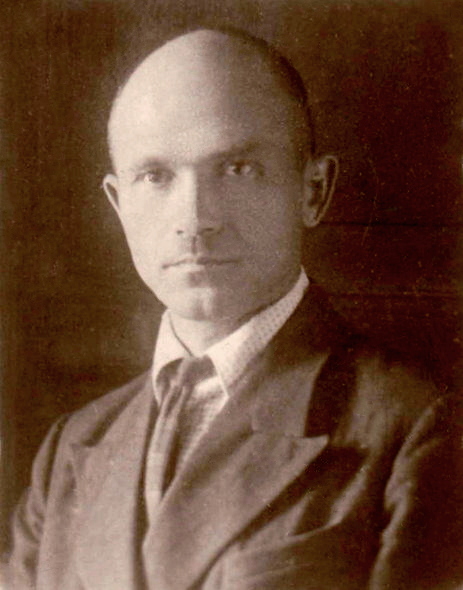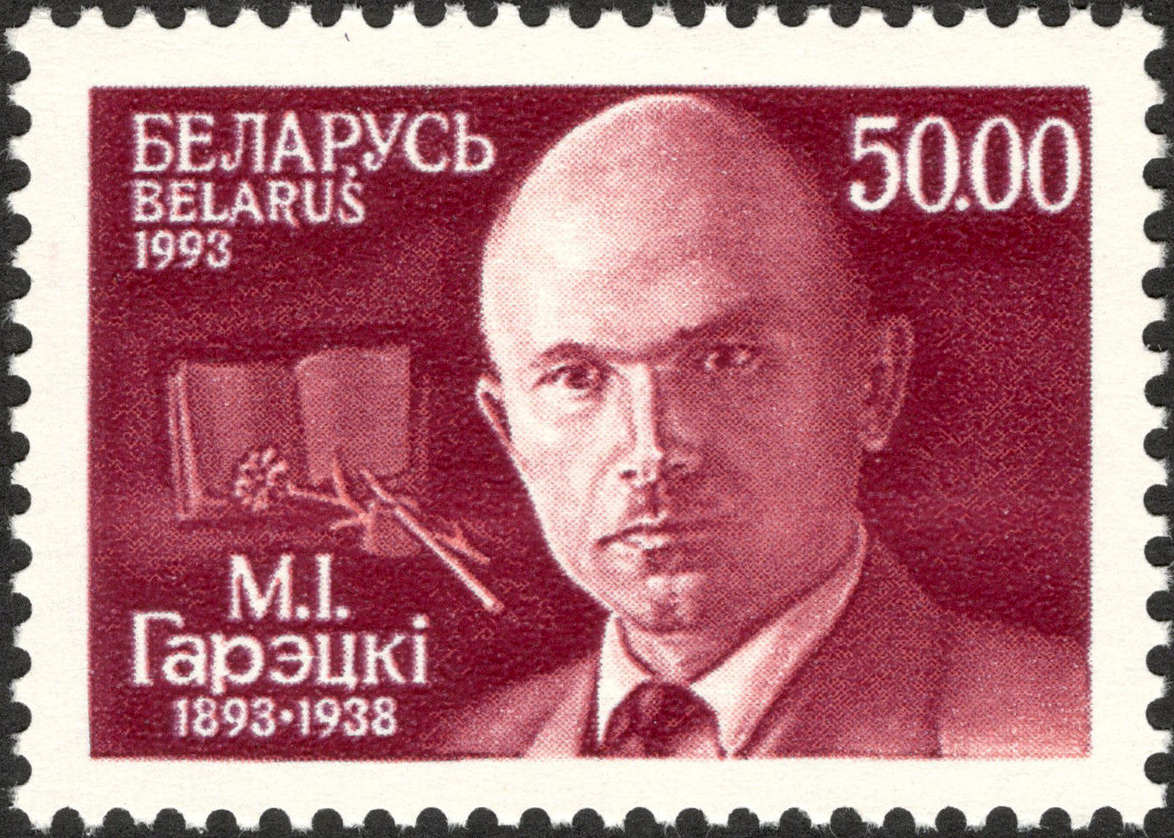Maksim Harecki on:
[Wikipedia]
[Google]
[Amazon]

 Maksim Haretski (18 February 1893 – 10 February 1938; be, Максі́м Іва́навіч Гарэ́цкі, russian: Макси́м Ива́нович Горе́цкий), also known as Maksim Harecki and Maksim Goretsky, was a Belarusian prose writer, journalist, activist of the Belarusian national renewal, folklorist, lexicographer, and professor. Maksim Harecki was also known by his pen-names ''Maksim Biełarus, M.B. Biełarus, M.H., A. Mścisłaŭski, Dzied Kuźma, Maciej Myška,'' and ''Mizeryjus Monus''. In his works he often appeared as ''Kuźma Batura, Liavon Zaduma.''
Maksim Harecki was born in village of Małaja Bahaćkaŭka in a peasant's family. He had two brothers – Haŭryła and Ivan.
In 1913 Harecki graduated from a college in Hory-Horki, and in 1916 from a military college in
Maksim Haretski (18 February 1893 – 10 February 1938; be, Максі́м Іва́навіч Гарэ́цкі, russian: Макси́м Ива́нович Горе́цкий), also known as Maksim Harecki and Maksim Goretsky, was a Belarusian prose writer, journalist, activist of the Belarusian national renewal, folklorist, lexicographer, and professor. Maksim Harecki was also known by his pen-names ''Maksim Biełarus, M.B. Biełarus, M.H., A. Mścisłaŭski, Dzied Kuźma, Maciej Myška,'' and ''Mizeryjus Monus''. In his works he often appeared as ''Kuźma Batura, Liavon Zaduma.''
Maksim Harecki was born in village of Małaja Bahaćkaŭka in a peasant's family. He had two brothers – Haŭryła and Ivan.
In 1913 Harecki graduated from a college in Hory-Horki, and in 1916 from a military college in
Maksim Harecki: biography in the Belarusian Electronic Encyclopedia
Some works by Maksim Harecki
{{DEFAULTSORT:Haretski, Maksim 1893 births 1938 deaths People from Mstsislaw District People from Mstislavsky Uyezd Belarusian writers Belarusian-language writers Soviet literary historians Soviet male writers 20th-century male writers Russian military personnel of World War I Belarusian people of World War I Recipients of the Order of St. George of the Fourth Degree Prisoners and detainees of Poland Belarusian prisoners and detainees Case of the Union of Liberation of Belarus Great Purge victims from Belarus Soviet rehabilitations

 Maksim Haretski (18 February 1893 – 10 February 1938; be, Максі́м Іва́навіч Гарэ́цкі, russian: Макси́м Ива́нович Горе́цкий), also known as Maksim Harecki and Maksim Goretsky, was a Belarusian prose writer, journalist, activist of the Belarusian national renewal, folklorist, lexicographer, and professor. Maksim Harecki was also known by his pen-names ''Maksim Biełarus, M.B. Biełarus, M.H., A. Mścisłaŭski, Dzied Kuźma, Maciej Myška,'' and ''Mizeryjus Monus''. In his works he often appeared as ''Kuźma Batura, Liavon Zaduma.''
Maksim Harecki was born in village of Małaja Bahaćkaŭka in a peasant's family. He had two brothers – Haŭryła and Ivan.
In 1913 Harecki graduated from a college in Hory-Horki, and in 1916 from a military college in
Maksim Haretski (18 February 1893 – 10 February 1938; be, Максі́м Іва́навіч Гарэ́цкі, russian: Макси́м Ива́нович Горе́цкий), also known as Maksim Harecki and Maksim Goretsky, was a Belarusian prose writer, journalist, activist of the Belarusian national renewal, folklorist, lexicographer, and professor. Maksim Harecki was also known by his pen-names ''Maksim Biełarus, M.B. Biełarus, M.H., A. Mścisłaŭski, Dzied Kuźma, Maciej Myška,'' and ''Mizeryjus Monus''. In his works he often appeared as ''Kuźma Batura, Liavon Zaduma.''
Maksim Harecki was born in village of Małaja Bahaćkaŭka in a peasant's family. He had two brothers – Haŭryła and Ivan.
In 1913 Harecki graduated from a college in Hory-Horki, and in 1916 from a military college in Petrograd
Saint Petersburg ( rus, links=no, Санкт-Петербург, a=Ru-Sankt Peterburg Leningrad Petrograd Piter.ogg, r=Sankt-Peterburg, p=ˈsankt pʲɪtʲɪrˈburk), formerly known as Petrograd (1914–1924) and later Leningrad (1924–1991), i ...
. During the First World War he served in the Russian Army. He was wounded on October 25, 1914, and had to recover in the military hospitals of Vilnia
The Vilnia (also ''Vilnelė''; , ''Vilnia'' ; ) is a river in Lithuania. Its source is near the village of Vindžiūnai, 5 km south of Šumskas, at the Lithuanian-Belarusian border. The Vilnia is 79.6 km long and its basin covers 624&n ...
, Moscow and Mahilioŭ
Mogilev (russian: Могилёв, Mogilyov, ; yi, מאָלעוו, Molev, ) or Mahilyow ( be, Магілёў, Mahilioŭ, ) is a city in eastern Belarus, on the Dnieper River, about from the border with Russia's Smolensk Oblast and from the bor ...
. After that, he continued to serve in the army until 1917 when he got very ill and was sent to Zheleznovodsk to recover and then left the army.
Later on, Harecki moved to Smolensk and studied in the Archaeological University there. At that time he started to work for local newspapers. Soon he moved to Minsk and in January 1919 to Vilnia
The Vilnia (also ''Vilnelė''; , ''Vilnia'' ; ) is a river in Lithuania. Its source is near the village of Vindžiūnai, 5 km south of Šumskas, at the Lithuanian-Belarusian border. The Vilnia is 79.6 km long and its basin covers 624&n ...
, where he began working in the Belarusian Gymnasium of Vilnia
The Belarusian Gymnasium of Vilnia ( be, Віленская беларуская гімназія) was an important Belarusian school in Vilnius. Many notable Belarusian cultural figures of the 20th century graduated from the school.
History
The ...
and some newspapers.
In 1919 he married Leaniła Čarniaŭskaja in Vilnia. His wife worked as a teacher in the Belarusian Gymnasium of Vilnia
The Belarusian Gymnasium of Vilnia ( be, Віленская беларуская гімназія) was an important Belarusian school in Vilnius. Many notable Belarusian cultural figures of the 20th century graduated from the school.
History
The ...
. They had a son Leanid who died in the battle of Leningrad. Also, they had a daughter, Halina.
In January 1922 Harecki was arrested by Polish authorities as a political criminal and was put into the infamous Łukiszki prison in Vilnia
The Vilnia (also ''Vilnelė''; , ''Vilnia'' ; ) is a river in Lithuania. Its source is near the village of Vindžiūnai, 5 km south of Šumskas, at the Lithuanian-Belarusian border. The Vilnia is 79.6 km long and its basin covers 624&n ...
. Following mass protests of the Belarusian minority, he was released and sent to Soviet-controlled East Belarus. There he worked as a language and literature professor at some universities. He was a member of the Inbelkult.
In 1929, along with other Belarusian
Belarusian may refer to:
* Something of, or related to Belarus
* Belarusians, people from Belarus, or of Belarusian descent
* A citizen of Belarus, see Demographics of Belarus
* Belarusian language
* Belarusian culture
* Belarusian cuisine
* Byelor ...
activists, Harecki became a target of a defamation campaign in the Soviet state media. He was arrested by the Soviets in July 1930 and accused of being a member of the Belarusian Liberation Union, a separatist organization. In April–May 1931 he was sentenced to five years of prison in Viatka. During this time Harecki wrote a lot of literature works. On November 4, 1937, he was arrested again and later on shot in the Great Purge. He was rehabilitated in 1957.
Today Maksim Harecki is considered a classic of Belarusian literature
Belarusian literature ( be, Беларуская лiтаратура, Biełaruskaja litaratura) is the writing produced, both prose and poetry, by speakers (not necessarily native speakers) of the Belarusian language.
History
Pre-17th century ...
. His books were translated into Ukrainian
Ukrainian may refer to:
* Something of, from, or related to Ukraine
* Something relating to Ukrainians, an East Slavic people from Eastern Europe
* Something relating to demographics of Ukraine in terms of demography and population of Ukraine
* So ...
, Russian, Polish
Polish may refer to:
* Anything from or related to Poland, a country in Europe
* Polish language
* Poles, people from Poland or of Polish descent
* Polish chicken
*Polish brothers (Mark Polish and Michael Polish, born 1970), American twin screenwr ...
, and German
German(s) may refer to:
* Germany (of or related to)
**Germania (historical use)
* Germans, citizens of Germany, people of German ancestry, or native speakers of the German language
** For citizens of Germany, see also German nationality law
**Ger ...
.
References
External links
Maksim Harecki: biography in the Belarusian Electronic Encyclopedia
Some works by Maksim Harecki
{{DEFAULTSORT:Haretski, Maksim 1893 births 1938 deaths People from Mstsislaw District People from Mstislavsky Uyezd Belarusian writers Belarusian-language writers Soviet literary historians Soviet male writers 20th-century male writers Russian military personnel of World War I Belarusian people of World War I Recipients of the Order of St. George of the Fourth Degree Prisoners and detainees of Poland Belarusian prisoners and detainees Case of the Union of Liberation of Belarus Great Purge victims from Belarus Soviet rehabilitations